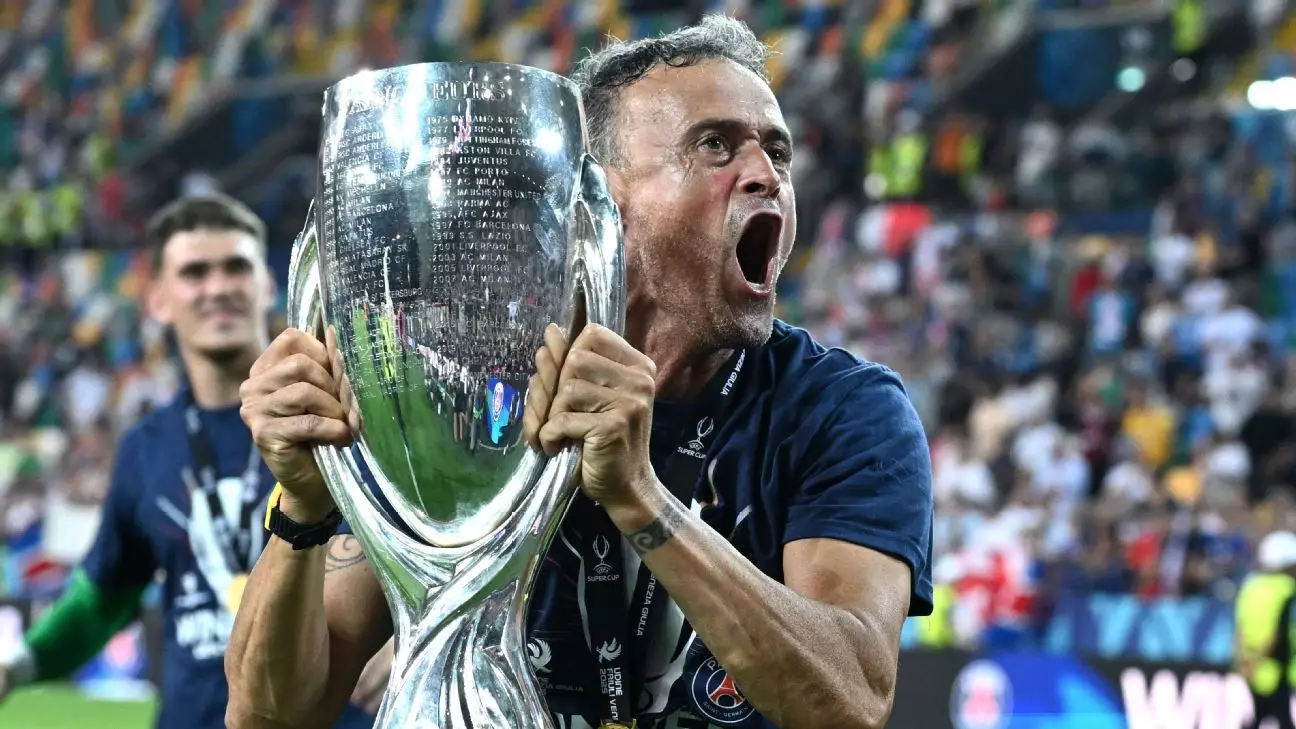In the recent UEFA Super Cup clash, Paris Saint-Germain’s dramatic victory against Tottenham Hotspur magnifies a paradox that often exists in football: the line between merit and luck. Luis Enrique’s admission that PSG “didn’t deserve” to win highlights an uncomfortable truth about the unpredictability of the sport. It’s a game where effort, preparation, and form often appear secondary to moments of sheer resilience and a touch of fortune. PSG’s ability to overturn a two-goal deficit in the final minutes exemplifies the beauty and chaos of football, but also underscores a broader critique — that victory, especially in high-stakes matches, can sometimes feel disconnected from consistent dominance or deserving performance.
The contrasting preparations of the teams further emphasize the disparities often seen in football. Tottenham’s six-week intensive training cycle gave them an edge in tempo and cohesion, reflected in their control of the game for most of the ninety minutes. PSG, still in the early stages of their pre-season rhythm, struggled to match Tottenham’s sharpness. This disparity isn’t merely a matter of fitness; it reveals the importance of strategy, timing, and the psychological readiness that comes with consistent play. That PSG, despite only a week of training, managed to conjure an unlikely comeback challenges our notions of fairness, forcing us to question whether victory in football truly hinges on the better team or the team that refuses to succumb.
The Power Play of Individual and Collective Resilience
Lee Kang-in’s vital goal and Gonçalo Ramos’s stoppage-time equalizer epitomize football’s unpredictability, turning despair into hope in the blink of an eye. Such moments reaffirm that resilience can defy the odds, transforming a game perceived as lost into one that demonstrates the extraordinary capacity of a team to fight back. This comeback, albeit boosted by luck, underscores an essential lesson: in football, mental tenacity and never-say-die attitude often eclipse technical superiority.
The dramatic penalty shootout, where PSG’s players demonstrated unwavering faith despite the mounting pressure, encapsulates the indomitable human spirit inherent in sports. Mendes’s decisive penalty, along with Chevalier’s brave save of Van de Ven’s shot, exemplifies leadership under pressure. Chevalier’s debut — marked by moments of both critique and heroism — highlights how individual resilience and fearlessness can galvanize a team. Despite a shaky start and conceding two goals, his ability to recover and save a crucial penalty is a testament to the importance of mental strength over mere technical prowess.
This resilience extends beyond individual efforts to a collective mindset. Vitinha’s comments about teamwork reflect the core ethos of football — that failure is just an opportunity to lift your teammate and push forward. It’s a culture that valorizes grit over perfection and persistence over flawless execution. Such a perspective echoes the broader understanding that sports are as much psychological as physical, and that true strength lies in bouncing back from setbacks.
The Complexity of Leadership and Identity in Modern Football
Luis Enrique’s commentary about the contrasting fitness levels and the perceived unfairness of the result also sheds light on the evolving nature of leadership in elite football. His acknowledgment of PSG’s recent intensive efforts contrasted with Tottenham’s well-established rhythm reveals the nuanced challenge managers face: balancing preparation with resilience. The fact that PSG only had six days of training underscores a broader issue in modern football, where the schedule and transfer demands often leave teams scrambling for cohesion at critical moments.
Furthermore, Enrique’s praise for Gianluigi Donnarumma’s absence and Chevalier’s display hints at a deeper narrative—the importance of charisma and personality in high-pressure environments. In a club like PSG, where the spotlight is relentless, players must demonstrate a mental fortitude that can inspire trust both within the squad and among supporters. Enrique’s recognition of this trait signals a shift in leadership paradigms, emphasizing internal strength and character over raw talent alone.
Finally, the match serves as a reminder that football is an arena where narratives are rewritten constantly. An underdog story is often crafted not just through skill but through unwavering belief and psychological resilience. PSG’s victory, born from an improbable comeback, questions conventional notions of fairness and highlights that the truest champions are often those who refuse to accept defeat, no matter how insurmountable the odds appear.

